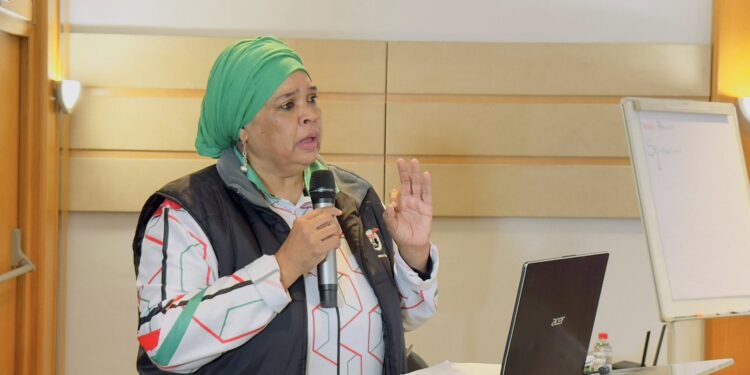The South African Democratic Teachers’ Union (SADTU) is taking a bold step toward strengthening the education system by launching a large scale training initiative that will equip 15 000 teachers with the skills to adapt to a changing world.
Speaking at the opening of the Teacher Union Collaboration (TUC) Assessment for Learning (AfL) Master Teacher Training under the theme “Skills for the Changing World”, SADTU Vice President for Education, Comrade Fasega Solomon, provided critical background and context to the gathering. The three-day training is being held at the Garden Court Nelson Mandela Boulevard in Cape Town.
“The SADTU AfL Master Teacher Training Programme is targeting to train seventy thousand teachers across the country,” said comrade Solomon. “This is part of our broader vision to empower educators and improve the quality of public education.”
Vice President Solomon took a moment to acknowledge her team and introduce key role-players in the initiative. “Let me recognise our HoD, Comrade Renny Somnath. Comrades, you will also see Comrade Thoko Ntshangase and Brenda Ndelu outside. Brenda is our Professional Development Specialist, while Comrade Thoko, though an administrator, also acts as Deputy Vice President in my absence. She keeps me sane and puts up with my 2 AM messages,” Solomon said, drawing warm laughter from the audience.
She went on to express appreciation for the Union’s Media Team, who were present to document the training for broader distribution. “The media team is always the one I don’t like because I don’t like being recorded but I’m very appreciative of them being here. Their work ensures that this content reaches others through our website, so that all our members, including you as Master Teachers, can review and benefit.”
Clarifying the purpose of the training, Solomon stated: “You are here to learn. You are not going to be a master trainer yet. You can observe the trainers, but your role now is to absorb and develop so we can support your growth into the profession.”
She also stressed the dual nature of SADTU’s mission. “Comrades, as a trade union, we stand on two legs, the leg of labour and the leg of education. Our legal responsibility is to negotiate and represent you, improve your working conditions, and ensure proper collective bargaining. But we also operate within education, and what happens in education impacts our members directly.”
Drawing from the Union’s constitution and historical themes, Solomon said quality education is not a side issue, it is central. “We are guided by the principles of accessible, equal, and qualitative education. Every programme we undertake is examined through the lens of whether it promotes equity, social cohesion, transformation, and social justice,” she said.
Cadre Solomon further criticised current austerity measures affecting education funding. “Education should not be part of irregular budgets. It must be protected from austerity cuts. These cuts have a direct impact on learners, teachers, and ultimately the country’s development.”
Referring to SADTU’s past congress themes, Solomon emphasised the union’s consistent prioritisation of quality education. “From ‘Quality Public Education’ in 1998 to ‘Free Quality Public Education’ in 2002, and now to our current focus “Strengthening Foundational Learning and Functional Skills’, our themes guide our programmes and reflect our unwavering commitment.”
She concluded with a powerful reminder: “If we do not get our foundation right, if we do not deliver learners with functional skills who can participate meaningfully in society then we have failed. Foundational learning is not optional. It is essential.”
The training programme continues this week, bringing together passionate educators committed to transforming South Africa’s education system from the ground up.










